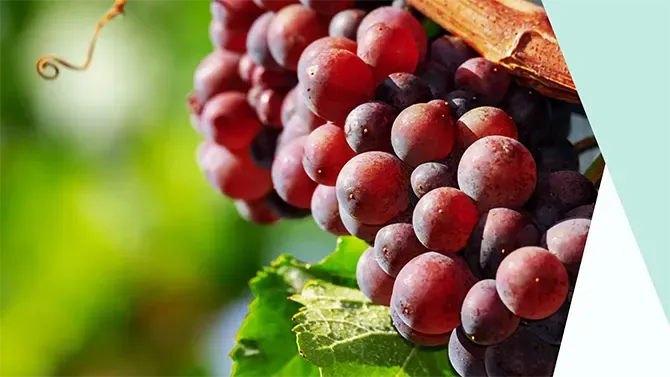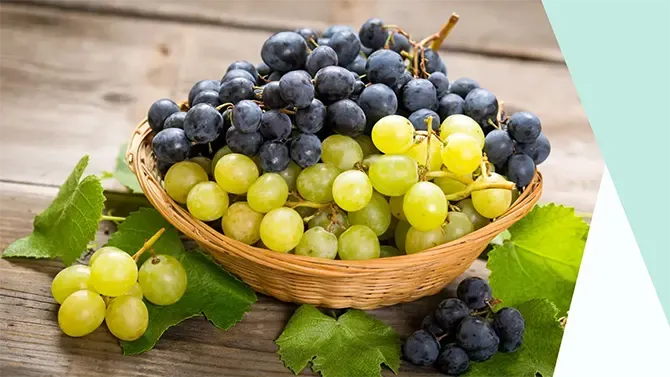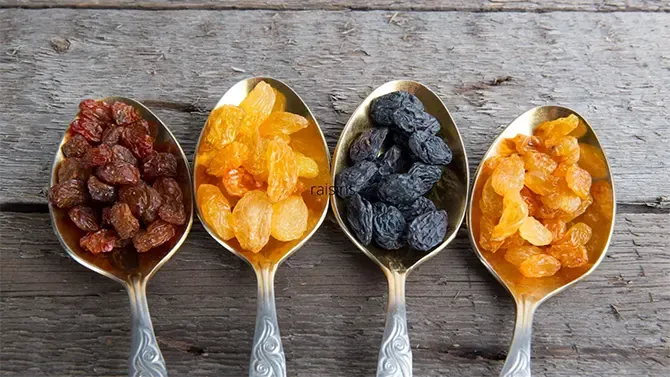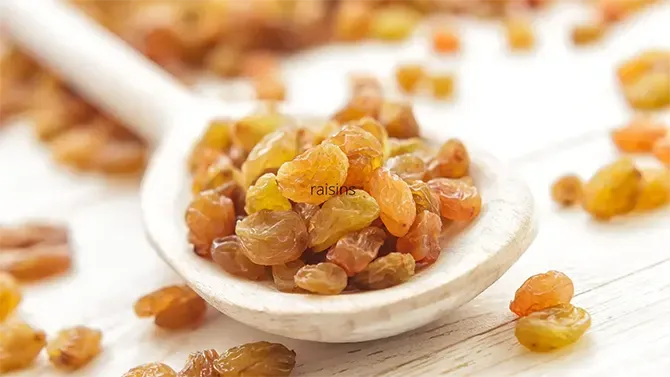Are grapes fattening?
Yes, I know, that's not an "acceptable" answer, but for "are grapes fattening?" it is, and you will see in detail why below! First, it is essential to differentiate fresh grapes and raisins because they do not have the same properties (sugar level, number of calories, etc.). Second, how much to eat will make all the difference in answering this question and helping you know how to lose weight.
In this article, I detail everything important to know about grapes. After reading this article, you will then enjoy eating your grapes without the risk of gaining weight, knowing all the benefits they will bring you.

They are very nutritious fruits that make a good snack.

European-style table grapes, such as red and green grapes, are also favourable. One cup of these grapes contains 104 calories, or 9% of the recommended daily calorie intake on a 1,200 calorie diet, or 6% on a 1,800 calorie plan.
Since grapes contain dietary fiber and are low in calories, you benefit from including them in your daily meals.
Also, suppose you start eating 100 grams (about 2/3 of a cup) of grapes a day and don't change anything else. The rest of your diet remains the same, and there is no change in your activity level. The next two years will be the same as the previous two years, with the sole exception of these grapes.
You are now consuming 69 more calories per day than before. Remember that your weight was stable, and you didn't change anything else. So you end up with a calorie surplus of 69. You can expect to gain one pound every 51 days, which works out to about 14 pounds over two years. Over ten years, you would gain 70 pounds!
I did this exercise for two reasons:
To emphasize how easy it is to gain weight slowly over the years, with just a small calorie surplus between 50 and 100 calories a day.
This is how many people become obese. But still, see the absurdity of blaming 69 calories from a cup of grapes because they make up a small percentage of your daily calorie consumption.
The assumption that you don't change anything else will never really be valid. It's a very different story for drinks over 300 calories at Starbucks and similar stores, and adding one or two a day has a much more significant effect.
On the other hand, I know many people who would never stop with only two-thirds of a cup of grapes. They eat it without realizing it and easily consume 300 calories or more.
If they did this every day, grapes would be in the same category as Starbucks drinks or soft drinks as significant contributors to weight gain!
The fat gain depends on the ratio of the calories your body takes into the calories it burns during exercise and other activities of daily living.
No type of food will automatically make you fat. Still, if a food's high caloric value increases your day's calorie intake beyond your calorie burn, it results in weight gain.
Because 1 pound of fat is made up of 3,500 calories, you probably won't see an instant fat gain. For example, if your calorie intake exceeds your calorie expenditure by 100 calories per day, it would take you 35 days to gain one pound of fat.
This is why weight gain can be subtle in the long run.

Raisins can help digestion, boost iron levels, and keep your bones healthy. So the next time you crave candy or treats, consider eating raisins to satisfy your craving, and your body will reap these benefits for your health.
The shrivelled yellow, brown, or purple pieces known as raisins are grapes that have been dried in the sun or a food dehydrator. Despite their small size, raisins are packed with energy and are rich in fibre, vitamins and minerals.
They are commonly used as a salad topping, mixed in oats, yoghurt, granola or cereal. You can also have them baked into delicious cookies, bread, and muffins.
Half a cup of raisins contains about 216 calories and 42 grams of sugar. For reference, a 12-ounce can of soda contains about 150 calories and 33 grams of sugar, depending on the brand. For this reason, raisins aren't precisely a low-calorie or low-sugar treat, and it's no wonder they're sometimes referred to as "nature's sweets."

This is why it is essential to monitor the number of raisins you eat at one time. Raisins are often sold in small individual boxes containing around 100 calories. If you have trouble with portion control, try buying these prepackaged raisins to control your intake.
For endurance athletes, raisins are a great alternative, and they provide a quick source of much-needed carbs and can help boost your performance.
Raisins contain enough sugar to give you a burst of energy. Consider replacing unhealthy sugary snacks with raisins if you have a sweet tooth.
Raisins contain more sugar and calories but are less nutritious than grapes. It is, therefore, best to eat them in moderation.
A low-calorie diet, combined with exercise, can keep your body in a calorie balance or a calorie deficit, which will cause you to maintain or lose weight respectively. A single serving of raisins is quick to eat, but its high caloric value can be a problem.
Suppose your recommended daily calorie intake is 1,800 calories, and you lead a sedentary lifestyle. In that case, the 100+ calories in the box of raisins is a significant chunk of your calorie budget. In this case, raisins could play a role in your weight gain, especially if you eat multiple servings.
Although you shouldn't be afraid to include raisins in your diet, be sure to limit them to a handful at a time.
Physical activity should already be part of your day. Still, you can make up for the hundred calories you consume when eating a small box of raisins by burning at least 100 calories during physical activity.
It will not take much time; a 30-minute walk for someone who weighs 155 pounds will more than offset the calories from the raisins.

These types of nutrients are antioxidants. Antioxidants help fight free radicals in your blood and prevent damage to your cells and DNA.
The skin and pulp of grapes contain the most polyphenols and have the highest antioxidant capacities.
Grapes are good for your health, mainly due to their polyphenol content. Polyphenols can help fight, among other things:
One study found that Concord grape juice taken for 12 weeks increased verbal learning in adults with declining memory but without dementia.
Grapes also improve digestion, and they work as a laxative due to their excellent insoluble fibre composition.
Half a cup of raisins will give you 2.7 grams of fibre, or about 6-12% of your daily needs, depending on your age and gender. Fibre helps your digestion by softening and increasing the weight and size of your stool. Larger stools are easier to pass and can help prevent constipation. Fibre also helps keep you full longer because it slows your stomach emptying. If you're trying to lose weight, eating fibrous foods can help.
Grapes also contain pterostilbene, a compound closely related to resveratrol. A stilbenoid compound, pterostilbene, can potentially reduce cholesterol levels. They have traces of phytosterols which also help lower harmful cholesterol levels.
Grapes also contain polyunsaturated fatty acids (PUFAs), such as linolenic acid. Linolenic acid is an essential fatty acid abundant in the epidermis of your skin. Research shows that dietary PUFA intake is essential for skin barrier function. PUFAs are also linked to skin photoprotection, a reduction in skin inflammation. They can also improve skin sensitivity.
A popular remedy is to apply crushed grapes directly to the skin to help soothe and brighten dry skin.
According to the Association for Vision and Ophthalmology Research, regular consumption of grapes can help protect against retinal deterioration, and this leads to retinal diseases such as macular degeneration.
In the study, retinal function was protected in mice given the equivalent of three servings of grapes a day. Additionally, mouse retinas thickened, and photoreceptor responses improved.
In this article, I detail everything important to know about grapes. After reading this article, you will then enjoy eating your grapes without the risk of gaining weight, knowing all the benefits they will bring you.
Are green grapes fattening?

Grapes are sweet; should I stop eating them to lose weight?
No. The problem is that we tend to eat way too many at once, as table grapes are one of the most convenient fruits to eat. We don't need to peel or chop them.They are very nutritious fruits that make a good snack.
Are grapes fattening or good for weight loss?
An important factor to consider is the number of calories in the fresh grape (we'll talk about raisins below).- The calorie count is very important if you're trying to lose weight, as they come in the form of fat, carbohydrates, and protein. Eating fewer calories than you burn helps you lose weight.
- Grapes are not fattening, and the calories in grapes are low – around 69 calories for a 100-gram serving. They also have a good amount of dietary fibre. As a result, eating grapes will help you stay full longer.
- There seems to be a link between eating grapes and losing weight. You see, calories are units of energy required by the body to perform daily activities.
- The body draws its energy from fat reserves to compensate for the caloric deficit in the absence of calories. The subsequent breakdown of fatty deposits induces weight loss. So, eating grapes in moderation will keep you full while working towards your weight loss goals.
- Most of the calories in grapes come from carbohydrates in sugars and dietary fiber. Only 1% of calories come from fat, and that's healthy dietary fat. Sugar in the form of fructose provides instant energy to the body.

How to eat grapes to lose weight?
On a 1,200 calorie diet, you can easily eat a cup of grapes as a snack. Black grapes provide only about 62 calories per cup, only 5% of the recommended daily calorie intake.European-style table grapes, such as red and green grapes, are also favourable. One cup of these grapes contains 104 calories, or 9% of the recommended daily calorie intake on a 1,200 calorie diet, or 6% on a 1,800 calorie plan.
Since grapes contain dietary fiber and are low in calories, you benefit from including them in your daily meals.
How would grapes make me fat?
I will give you a concrete example. Suppose your weight is very stable. That is, you haven't gained or lost weight in a year or two.Also, suppose you start eating 100 grams (about 2/3 of a cup) of grapes a day and don't change anything else. The rest of your diet remains the same, and there is no change in your activity level. The next two years will be the same as the previous two years, with the sole exception of these grapes.
You are now consuming 69 more calories per day than before. Remember that your weight was stable, and you didn't change anything else. So you end up with a calorie surplus of 69. You can expect to gain one pound every 51 days, which works out to about 14 pounds over two years. Over ten years, you would gain 70 pounds!
I did this exercise for two reasons:
To emphasize how easy it is to gain weight slowly over the years, with just a small calorie surplus between 50 and 100 calories a day.
This is how many people become obese. But still, see the absurdity of blaming 69 calories from a cup of grapes because they make up a small percentage of your daily calorie consumption.
The assumption that you don't change anything else will never really be valid. It's a very different story for drinks over 300 calories at Starbucks and similar stores, and adding one or two a day has a much more significant effect.
On the other hand, I know many people who would never stop with only two-thirds of a cup of grapes. They eat it without realizing it and easily consume 300 calories or more.
If they did this every day, grapes would be in the same category as Starbucks drinks or soft drinks as significant contributors to weight gain!
The fat gain depends on the ratio of the calories your body takes into the calories it burns during exercise and other activities of daily living.
No type of food will automatically make you fat. Still, if a food's high caloric value increases your day's calorie intake beyond your calorie burn, it results in weight gain.
Because 1 pound of fat is made up of 3,500 calories, you probably won't see an instant fat gain. For example, if your calorie intake exceeds your calorie expenditure by 100 calories per day, it would take you 35 days to gain one pound of fat.
This is why weight gain can be subtle in the long run.

How to incorporate grapes into your diet?
You can take them as part of your lunch or an afternoon snack. Grapes are easy to wash and bring to make a healthy snack. Other ways to enjoy grapes are:- make fresh grape juice (drink 100% grape juice, no added sugar)
- add fresh grapes to your smoothie to replace the sugar (a smoothie trick )
- add chopped or whole grapes to your cereal or oatmeal in the morning
- add chopped or entire grapes to a green salad or fruit salad
- eat frozen grapes for a refreshing summer snack
What about raisins? Are they suitable for you?
Raisins are naturally sweet and high in sugar and calories. Still, they are beneficial to your health when eaten in moderation.Raisins can help digestion, boost iron levels, and keep your bones healthy. So the next time you crave candy or treats, consider eating raisins to satisfy your craving, and your body will reap these benefits for your health.
The shrivelled yellow, brown, or purple pieces known as raisins are grapes that have been dried in the sun or a food dehydrator. Despite their small size, raisins are packed with energy and are rich in fibre, vitamins and minerals.
They are commonly used as a salad topping, mixed in oats, yoghurt, granola or cereal. You can also have them baked into delicious cookies, bread, and muffins.
Are raisins fattening?
A small box of raisins makes an ideal snack at home or work when you need a sweet treat to get you through the afternoon. Although raisins are high in calories, they will not automatically lead to fat gain. However, suppose you eat these dried fruits excessively. In that case, your body is likely to experience a calorie excess, in which case you will gain weight.Half a cup of raisins contains about 216 calories and 42 grams of sugar. For reference, a 12-ounce can of soda contains about 150 calories and 33 grams of sugar, depending on the brand. For this reason, raisins aren't precisely a low-calorie or low-sugar treat, and it's no wonder they're sometimes referred to as "nature's sweets."

Beware the Calories in Raisins
Like any dried fruit, overeating can be detrimental to health due to its high sugar and calorie content.This is why it is essential to monitor the number of raisins you eat at one time. Raisins are often sold in small individual boxes containing around 100 calories. If you have trouble with portion control, try buying these prepackaged raisins to control your intake.
For endurance athletes, raisins are a great alternative, and they provide a quick source of much-needed carbs and can help boost your performance.
Raisins contain enough sugar to give you a burst of energy. Consider replacing unhealthy sugary snacks with raisins if you have a sweet tooth.
Raisins contain more sugar and calories but are less nutritious than grapes. It is, therefore, best to eat them in moderation.
A low-calorie diet, combined with exercise, can keep your body in a calorie balance or a calorie deficit, which will cause you to maintain or lose weight respectively. A single serving of raisins is quick to eat, but its high caloric value can be a problem.
Suppose your recommended daily calorie intake is 1,800 calories, and you lead a sedentary lifestyle. In that case, the 100+ calories in the box of raisins is a significant chunk of your calorie budget. In this case, raisins could play a role in your weight gain, especially if you eat multiple servings.
Although you shouldn't be afraid to include raisins in your diet, be sure to limit them to a handful at a time.
How to eat raisins without gaining weight?
If you love the taste of raisins and want to include them in your diet more while maintaining a healthy weight, give yourself peace of mind by engaging in regular exercise and maintaining a balanced diet.Physical activity should already be part of your day. Still, you can make up for the hundred calories you consume when eating a small box of raisins by burning at least 100 calories during physical activity.
It will not take much time; a 30-minute walk for someone who weighs 155 pounds will more than offset the calories from the raisins.
Want to try making your raisins?
It's simple:- Get grapes.
- Remove large stems.
- Wash them in cold water.
- Place them on a tray and set it outside on a dry, sunny day (this works best if the tray has holes or cracks for air circulation).
- Rotate the grapes to ensure even exposure to the sun.
- In just two or three days, you will have your raisins.
Important information for people with diabetes regarding the glycemic index of grapes
- Grapes contain natural sugar, but they are considered a low glycemic index (GI) food. This means that a single serving is unlikely to raise your blood sugar significantly.
- But raisins are another story. The sugar in the grapes concentrates during the dehydration process, raising their GI level to moderate.
- The American Diabetes Association encourages the consumption of fresh fruit as part of a healthy diet. Dehydrated fruits like grapes should be eaten in moderation.
- Although eating too many raisins may increase your likelihood of gaining weight, a small serving of this source of natural sugars and complex carbohydrates is often ideal for people with diabetes.
- When your blood sugar is low, the University of Michigan's Comprehensive Diabetes Center recommends eating something sweet, such as raisins.
- Don't take too much, though. Two tablespoons of raisins provide about 15 grams of carbs and maybe enough to reduce symptoms of low blood sugar.
Top 12 Nutritional Benefits of Grapes

1- Grapes are a good source of polyphenols (Antioxidants)
Grapes are an excellent source of natural chemicals called phytonutrients, such as phenols and polyphenols. Polyphenols are compounds that give grapes and other plants their vibrant colours, and they also protect against disease and environmental damage.These types of nutrients are antioxidants. Antioxidants help fight free radicals in your blood and prevent damage to your cells and DNA.
The skin and pulp of grapes contain the most polyphenols and have the highest antioxidant capacities.
Grapes are good for your health, mainly due to their polyphenol content. Polyphenols can help fight, among other things:
- diabetes
- cancer
- Alzheimer's disease
- lung disease
- osteoporosis
- heart disease
2- Grapes support a healthy heart.
Eat grapes for a healthier heart and help you have better cardiovascular health. The polyphenols in grapes may help prevent cardiovascular disease. In addition to scavenging free radicals, grapes have anti-inflammatory, anti-platelet effects and support endothelial function. Endothelial dysfunction is linked to risk factors for accumulation in the arteries (atherosclerosis).3- Grapes may help slow ageing.
Grapes contain resveratrol, a type of polyphenol, which can help prevent degenerative diseases. Resveratrol can turn on your longevity genes and help cells survive.4- Grapes can boost memory.
Research shows that antioxidant-rich fruits, such as grape juice help reduce oxidative stress that leads to ageing. In studies, this reduction increased performance in verbal memory and motor function.One study found that Concord grape juice taken for 12 weeks increased verbal learning in adults with declining memory but without dementia.
5- Grapes give you fibre.
Grapes contain a small amount of soluble fibre, which can lower cholesterol and blood sugar levels. If you have bowel irregularities, eating more fibre may help.Grapes also improve digestion, and they work as a laxative due to their excellent insoluble fibre composition.
Half a cup of raisins will give you 2.7 grams of fibre, or about 6-12% of your daily needs, depending on your age and gender. Fibre helps your digestion by softening and increasing the weight and size of your stool. Larger stools are easier to pass and can help prevent constipation. Fibre also helps keep you full longer because it slows your stomach emptying. If you're trying to lose weight, eating fibrous foods can help.
6- Grapes can lower cholesterol levels.
Fibre also plays a role in cholesterol levels. Dietary fibre is known to lower "bad" low-density lipoprotein (LDL) cholesterol levels.Grapes also contain pterostilbene, a compound closely related to resveratrol. A stilbenoid compound, pterostilbene, can potentially reduce cholesterol levels. They have traces of phytosterols which also help lower harmful cholesterol levels.
Grapes also contain polyunsaturated fatty acids (PUFAs), such as linolenic acid. Linolenic acid is an essential fatty acid abundant in the epidermis of your skin. Research shows that dietary PUFA intake is essential for skin barrier function. PUFAs are also linked to skin photoprotection, a reduction in skin inflammation. They can also improve skin sensitivity.
A popular remedy is to apply crushed grapes directly to the skin to help soothe and brighten dry skin.
7- Grapes help with eye health.
Move over, carrots! Grapes may soon become your best eye health food.According to the Association for Vision and Ophthalmology Research, regular consumption of grapes can help protect against retinal deterioration, and this leads to retinal diseases such as macular degeneration.
In the study, retinal function was protected in mice given the equivalent of three servings of grapes a day. Additionally, mouse retinas thickened, and photoreceptor responses improved.
8- Grapes May Help Prevent Metabolic Syndrome
According to the National Heart, Blood, and Lung Institute, metabolic syndrome refers to a group of risk factors that increase your risk of heart disease, diabetes, and stroke. These risk factors include:- a large waistline
- high triglycerides
- low HDL ("good")
- cholesterol
- high blood pressure
- high blood
- Sugar.
Foods rich in polyphenols such as grapes may help protect against metabolic syndrome. Study results suggest that grape polyphenols, especially grape seed polyphenols, help improve cholesterol profile, blood pressure, and blood sugar levels.
Iron is important for making red blood cells and helping them carry oxygen to your body's cells. It will help if you consume enough iron to prevent iron deficiency anaemia.
If you're a postmenopausal woman, raisins make a great snack because the calcium helps prevent the development of osteoporosis, a disease characterized by bone loss that typically occurs with age.
To add this, raisins contain a high amount of trace element boron. Boron works with vitamin D and calcium to keep your bones and joints healthy, and it also plays a role in the treatment of osteoporosis.
Conclusion
Grapes are delicious, healthy, and easy to eat, but be mindful of your serving size. If you overeat all at once, the calories and carbs add up quickly, negating the health benefits and increasing the risk of weight gain. The more calories you burn in your day, the more you can afford to eat.
9- Grapes Provide Vitamin K
Grapes are a good source of vitamin K. Vitamin K helps your blood clot, and vitamin K deficiency puts you at risk of bleeding. It may also increase your risk of osteoporosis, although more studies are needed.10- Grapes contain iron
Grapes and raisins are a good source of iron. Half a cup of raisins contains 1.4 milligrams of iron, and this is about 7% of the recommended daily amount for most adult women and 17% for adult men.Iron is important for making red blood cells and helping them carry oxygen to your body's cells. It will help if you consume enough iron to prevent iron deficiency anaemia.
11- Grapes contain calcium and boron.
Raisins have about 36 milligrams of calcium per 1/2 cup serving, and this represents about 5% of your daily needs. Calcium is essential for the health and strength of bones and teeth.If you're a postmenopausal woman, raisins make a great snack because the calcium helps prevent the development of osteoporosis, a disease characterized by bone loss that typically occurs with age.
To add this, raisins contain a high amount of trace element boron. Boron works with vitamin D and calcium to keep your bones and joints healthy, and it also plays a role in the treatment of osteoporosis.
12- Grapes help your gums and teeth.
Studies have shown that raisins contain phytochemicals to support healthy teeth and gums. Phytochemicals found in raisins, including oleanolic acid, linoleic acid, and linolenic acid, fight bacteria in the mouth that cause cavities. In other words, eating raisins instead of sugary snacks can keep your smile healthy.Conclusion
Grapes are delicious, healthy, and easy to eat, but be mindful of your serving size. If you overeat all at once, the calories and carbs add up quickly, negating the health benefits and increasing the risk of weight gain. The more calories you burn in your day, the more you can afford to eat.
Post a Comment